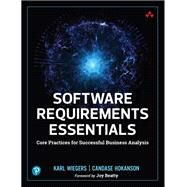Software Requirements Essentials Core Practices for Successful Business Analysis
, by Wiegers, Karl; Hokanson, Candase- ISBN: 9780138190286 | 0138190283
- Cover: Paperback
- Copyright: 4/30/2023
20 Best Practices for Developing and Managing Requirements on Any Project
Software Requirements Essentials presents 20 core practices for successful project and requirements elicitation, analysis, specification, validation, and management. Leading requirements experts Kurt Wiegers and Candase Hokanson focus on the practices most likely to deliver superior value in both traditional and agile projects, in any application domain. These core practices help teams understand business problems, engage the right participants, articulate better solutions, improve communication, implement the best functionality in the right sequence, and adapt to change and growth.
Concise and tightly focused, this book offers just enough pragmatic "how-to" detail for you to apply the core practices with confidence, whether you're an analyst, engineer, product manager, product owner, or developer. Using it, your entire team can build a shared understanding of key concepts, terminology, techniques, and rationales--and work together more effectively on every project.
- Clarify problems, define business objectives, and set boundaries
- Identify stakeholders and empower decision-makers
- Describe user tasks, events, and responses
- Assess data concepts, relationships, and quality attributes
- Analyze requirements and requirement sets, create models and prototypes, and set priorities
- Specify requirements in a consistent, structured, well-documented fashion
- Review, test, and manage change to requirements
"I once read the ten best-selling requirements engineering books of the prior ten years. This one book succinctly presents more useful information than those ten books combined."
--Mike Cohn, author of User Stories Applied and co-founder, Scrum Alliance







